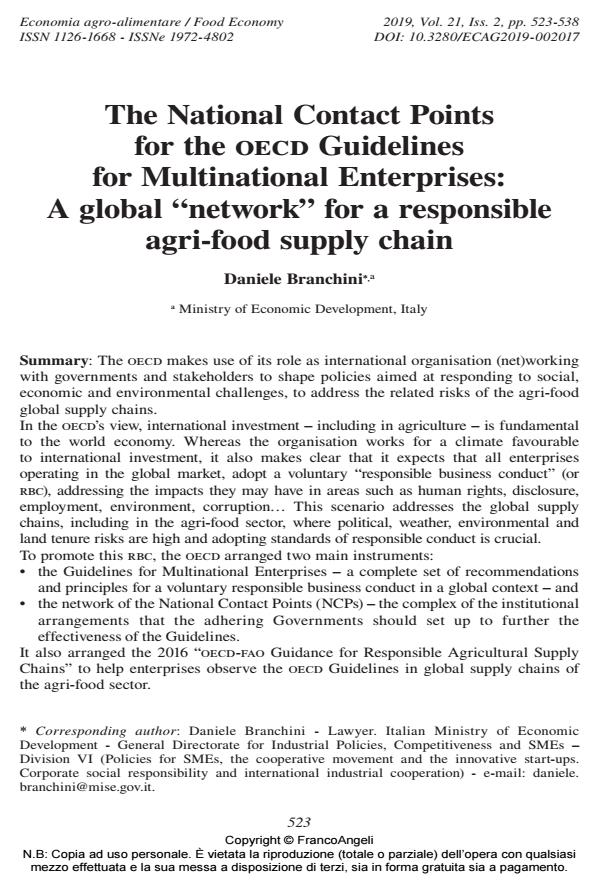The National Contact Points for the oecd Guidelines for Multinational Enterprises: A global "network" for a responsible agri-food supply chain
Journal title ECONOMIA AGRO-ALIMENTARE
Author/s Daniele Branchini
Publishing Year 2019 Issue 2019/2
Language English Pages 16 P. 523-538 File size 143 KB
DOI 10.3280/ECAG2019-002017
DOI is like a bar code for intellectual property: to have more infomation
click here
Below, you can see the article first page
If you want to buy this article in PDF format, you can do it, following the instructions to buy download credits

FrancoAngeli is member of Publishers International Linking Association, Inc (PILA), a not-for-profit association which run the CrossRef service enabling links to and from online scholarly content.
The oecd makes use of its role as international organisation (net)working with governments and stakeholders to shape policies aimed at responding to social, economic and environmental challenges, to address the related risks of the agri-food global supply chains. In the oecd’s view, international investment - including in agriculture - is fundamental to the world economy. Whereas the organisation works for a climate favourable to international investment, it also makes clear that it expects that all enterprises operating in the global market, adopt a voluntary "responsible business conduct" (or rbc), addressing the impacts they may have in areas such as human rights, disclosure, employment, environment, corruption" This scenario addresses the global supply chains, including in the agri-food sector, where political, weather, environmental and land tenure risks are high and adopting standards of responsible conduct is crucial. To promote this rbc, the oecd arranged two main instruments: " the Guidelines for Multinational Enterprises - a complete set of recommendations and principles for a voluntary responsible business conduct in a global context - and - the network of the National Contact Points (NCPs) - the complex of the institutional arrangements that the adhering Governments should set up to further the effectiveness of the Guidelines. It also arranged the 2016 "oecd-fao Guidance for Responsible Agricultural Supply Chains" to help enterprises observe the oecd Guidelines in global supply chains of the agri-food sector. This note will focus on the innovative character of this system; on the NCPs’ task to implement and "enforce" the oecd Guidelines (a soft law instrument), and on the ways the international NCPs’ network can contribute to a responsible management of the agri-food supply chains. It will highlight the importance of the cooperation among NCPs, enterprises, governments, worker organisations and NGOs to encourage the widest adoption of the oecd Guidelines. In particular, it will focus on the need for the NCPs of the different countries to co-operate, in search of a common understanding on common issues. Cooperation will be also presented as crucial for managing the non- judicial grievance mechanism entrusted to the NCPs to find a consensual settlement of disputes, arising from the alleged breach of the Guidelines, between one or more stakeholder(s) and one or more enterprise(s), also in the agri-food sector.
Keywords: Oecd Guidelines; National Contact Points; Responsible business conduct; due diligence; global supply chains.
Jel codes: Q01, Q10, Q18
Daniele Branchini, The National Contact Points for the oecd Guidelines for Multinational Enterprises: A global "network" for a responsible agri-food supply chain in "ECONOMIA AGRO-ALIMENTARE" 2/2019, pp 523-538, DOI: 10.3280/ECAG2019-002017